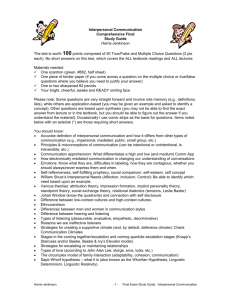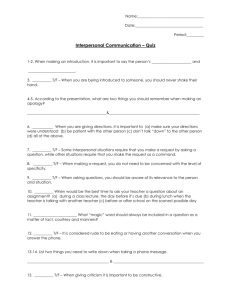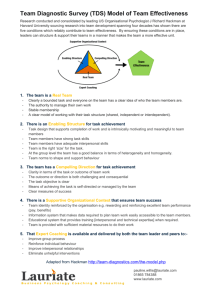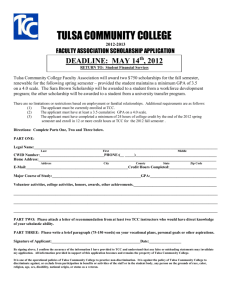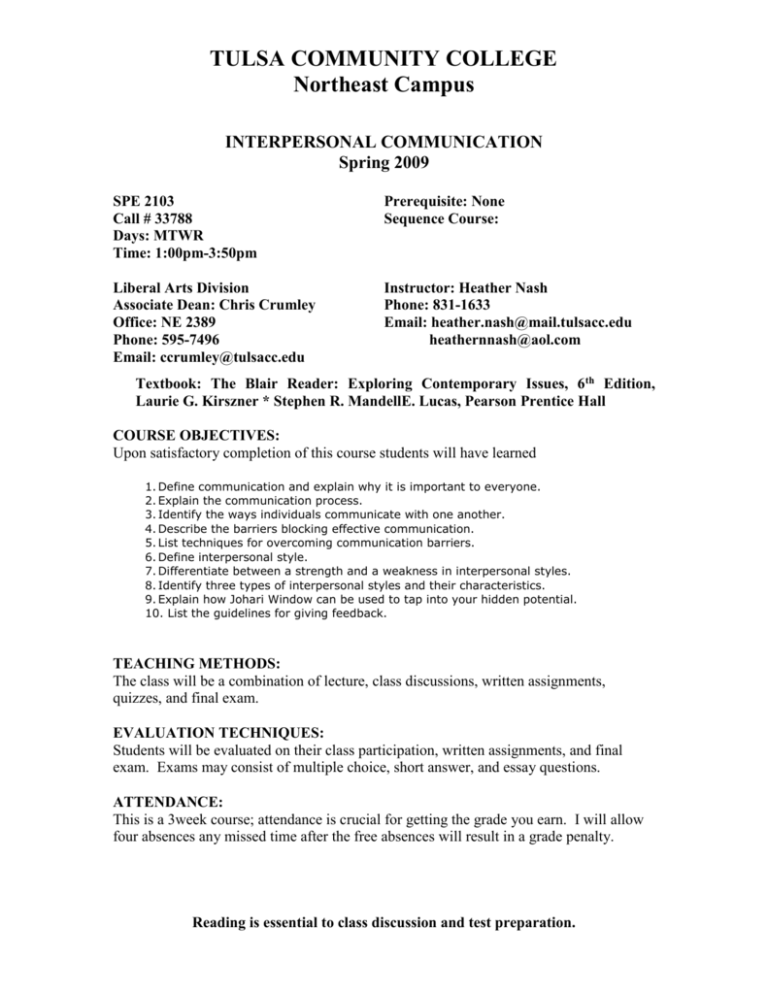
TULSA COMMUNITY COLLEGE
Northeast Campus
INTERPERSONAL COMMUNICATION
Spring 2009
SPE 2103
Call # 33788
Days: MTWR
Time: 1:00pm-3:50pm
Prerequisite: None
Sequence Course:
Liberal Arts Division
Associate Dean: Chris Crumley
Office: NE 2389
Phone: 595-7496
Email: ccrumley@tulsacc.edu
Instructor: Heather Nash
Phone: 831-1633
Email: heather.nash@mail.tulsacc.edu
heathernnash@aol.com
Textbook: The Blair Reader: Exploring Contemporary Issues, 6 th Edition,
Laurie G. Kirszner * Stephen R. MandellE. Lucas, Pearson Prentice Hall
COURSE OBJECTIVES:
Upon satisfactory completion of this course students will have learned
1. Define communication and explain why it is important to everyone.
2. Explain the communication process.
3. Identify the ways individuals communicate with one another.
4. Describe the barriers blocking effective communication.
5. List techniques for overcoming communication barriers.
6. Define interpersonal style.
7. Differentiate between a strength and a weakness in interpersonal styles.
8. Identify three types of interpersonal styles and their characteristics.
9. Explain how Johari Window can be used to tap into your hidden potential.
10. List the guidelines for giving feedback.
TEACHING METHODS:
The class will be a combination of lecture, class discussions, written assignments,
quizzes, and final exam.
EVALUATION TECHNIQUES:
Students will be evaluated on their class participation, written assignments, and final
exam. Exams may consist of multiple choice, short answer, and essay questions.
ATTENDANCE:
This is a 3week course; attendance is crucial for getting the grade you earn. I will allow
four absences any missed time after the free absences will result in a grade penalty.
Reading is essential to class discussion and test preparation.
TULSA COMMUNITY COLLEGE
Northeast Campus
LATE ASSIGNMENTS AND MAKE-UP WORK:
An assignment is late as soon as the deadline passes, and work is one day late for exactly
twenty-four hours after the deadline. For example, if an essay is due on Sunday at
midnight, it is one day late on Monday at 12:01 a.m. and two days late on Tuesday at
12:01 a.m. The following policies apply to assignments handed in after the deadline.
Course Withdrawal: The deadline to withdraw from a course shall not exceed 3/4 the
duration of any class. Contact the Counseling Office at any TCC campus to initiate
withdrawal from a course ('W' grade) or to change from Credit to Audit. Check the TCC
Academic Calendar for deadlines. Students who stop participating in the course and fail
to withdraw may receive a course grade of “F,” which may have financial aid
consequences for the student.
COMMUNICATIONS:
Email: All TCC students receive a designated “MyTCC” email address (ex:
jane.doe@mail.tulsacc.edu). All communications to you about TCC and course
assignments will be sent to your MyTCC email address; and you must use
MyTCC email to send email to, and receive email from, the instructor regarding
this course.
Inclement Weather: TCC rarely closes. If extreme weather conditions or
emergency situations arise, TCC always gives cancellation notices to radio and
television stations. This information is also posted on the TCC website
(www.tulsacc.edu).
GENERAL EDUCATION GOALS: General Education courses at TCC ensure that our
graduates gain skills, knowledge, and abilities that comprise a common foundation for
their higher education and a backdrop for their work and personal lives. TCC’s General
Education goals are: Critical Thinking, Effective Communication, Engaged Learning, and
Technological Proficiency.
CLASSROOM ETIQUETTE: Open and mutually respectful communication of varied
opinions, beliefs, and perspectives during classroom or online discussion encourages the
free exchange of ideas that is essential to higher learning and to the ability to learn from
each other. Use of any electronic device is at the discretion of the instructor.
SYLLABUS CHANGES: Occasionally, changes to the syllabus may be necessary.
Students will be notified of any changes to the syllabus in writing.
STUDENTS WITH DISABILITIES: TCC provides accommodations for qualifying
students in compliance with the Americans with Disabilities Act. For information,
Reading is essential to class discussion and test preparation.
TULSA COMMUNITY COLLEGE
Northeast Campus
students may contact the disabled Student Resource Center, 918-595-7115, or the
Resource Center for the Deaf and Hard of Hearing, 918-595-7428V, 918-595-7434TTY.
ACADEMIC DISHONESTY: Academic dishonesty (cheating) is defined as the
deception of others about one’s own work or about the work of another. Academic
dishonesty or misconduct is not condoned or tolerated at campuses within the Tulsa
Community College system. Tulsa Community College adopts a policy delegating certain
forms of authority for disciplinary action to the faculty. Such disciplinary actions
delegated to the faculty include, but are not limited to, the dismissal of disrespectful or
disorderly students from classes. In the case of academic dishonesty a faculty member
may:
Require the student to redo an assignment or test, or require the student to
complete a substitute assignment or test;
Record a "zero" for the assignment or test in question;
Recommend to the student that the student withdraw from the class, or
administratively withdraw the student from the class;
Record a grade of "F" for the student at the end of the semester. Faculty may
request that disciplinary action be taken against a student at the administrative
level by submitting such a request to the Dean of Student Services.
INSTITUTIONAL STATEMENT: Each student is responsible for being aware
of the information contained in the TCC Catalog, the TCC Student Policies &
Resources Handbook, and semester information listed in the class schedule. All
information may be viewed on the TCC website: www.tulsacc.edu
GRADING SYSTEM
Assignments
Short essays (11)
Class Discussion
Final Exam
Total Points Possible
Points Possible
600
100
50
100
950
Points Each
100
100
1
100
Grading Scale A= 90-100% B= 90-89% C= 60-69% F= Below 60%
Reading is essential to class discussion and test preparation.
TULSA COMMUNITY COLLEGE
Northeast Campus
TENTATIVE COURSE CALENDAR:
Week 1
Part I Interpersonal Communication preliminaries
Universals of Interpersonal Communication
Culture in Interpersonal Communication
The Self in Interpersonal Communication
Perception in Interpersonal Communication
Listening in Interpersonal Communication
Week 2
Part II Messages: Verbal and Nonverbal
Universals of Verbal and Nonverbal Messages
Verbal messages
Nonverbal messages
Messages and Conversation
Week 3
Part III Interpersonal Relationships
Universal of Interpersonal Relationships
Interpersonal Relationships: Growth and Deterioration
Interpersonal relationships: Friendship, Love, Family,
Workplace
Conflict in Interpersonal Relationships
Power in Interpersonal Relationships
Reading is essential to class discussion and test preparation.




